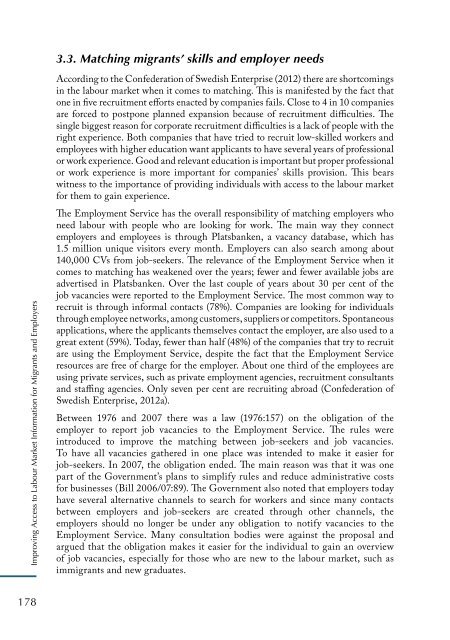International Organization for Migration (IOM)
International Organization for Migration (IOM)
International Organization for Migration (IOM)
Create successful ePaper yourself
Turn your PDF publications into a flip-book with our unique Google optimized e-Paper software.
Improving Access to Labour market In<strong>for</strong>mation <strong>for</strong> migrants and employers<br />
178<br />
3.3. Matching migrants’ skills and employer needs<br />
According to the Confederation of Swedish Enterprise (2012) there are shortcomings<br />
in the labour market when it comes to matching. This is manifested by the fact that<br />
one in five recruitment ef<strong>for</strong>ts enacted by companies fails. Close to 4 in 10 companies<br />
are <strong>for</strong>ced to postpone planned expansion because of recruitment difficulties. The<br />
single biggest reason <strong>for</strong> corporate recruitment difficulties is a lack of people with the<br />
right experience. Both companies that have tried to recruit low-skilled workers and<br />
employees with higher education want applicants to have several years of professional<br />
or work experience. Good and relevant education is important but proper professional<br />
or work experience is more important <strong>for</strong> companies’ skills provision. This bears<br />
witness to the importance of providing individuals with access to the labour market<br />
<strong>for</strong> them to gain experience.<br />
The Employment Service has the overall responsibility of matching employers who<br />
need labour with people who are looking <strong>for</strong> work. The main way they connect<br />
employers and employees is through Platsbanken, a vacancy database, which has<br />
1.5 million unique visitors every month. Employers can also search among about<br />
140,000 CVs from job-seekers. The relevance of the Employment Service when it<br />
comes to matching has weakened over the years; fewer and fewer available jobs are<br />
advertised in Platsbanken. Over the last couple of years about 30 per cent of the<br />
job vacancies were reported to the Employment Service. The most common way to<br />
recruit is through in<strong>for</strong>mal contacts (78%). Companies are looking <strong>for</strong> individuals<br />
through employee networks, among customers, suppliers or competitors. Spontaneous<br />
applications, where the applicants themselves contact the employer, are also used to a<br />
great extent (59%). Today, fewer than half (48%) of the companies that try to recruit<br />
are using the Employment Service, despite the fact that the Employment Service<br />
resources are free of charge <strong>for</strong> the employer. About one third of the employees are<br />
using private services, such as private employment agencies, recruitment consultants<br />
and staffing agencies. Only seven per cent are recruiting abroad (Confederation of<br />
Swedish Enterprise, 2012a).<br />
Between 1976 and 2007 there was a law (1976:157) on the obligation of the<br />
employer to report job vacancies to the Employment Service. The rules were<br />
introduced to improve the matching between job-seekers and job vacancies.<br />
To have all vacancies gathered in one place was intended to make it easier <strong>for</strong><br />
job-seekers. In 2007, the obligation ended. The main reason was that it was one<br />
part of the Government’s plans to simplify rules and reduce administrative costs<br />
<strong>for</strong> businesses (Bill 2006/07:89). The Government also noted that employers today<br />
have several alternative channels to search <strong>for</strong> workers and since many contacts<br />
between employers and job-seekers are created through other channels, the<br />
employers should no longer be under any obligation to notify vacancies to the<br />
Employment Service. Many consultation bodies were against the proposal and<br />
argued that the obligation makes it easier <strong>for</strong> the individual to gain an overview<br />
of job vacancies, especially <strong>for</strong> those who are new to the labour market, such as<br />
immigrants and new graduates.


